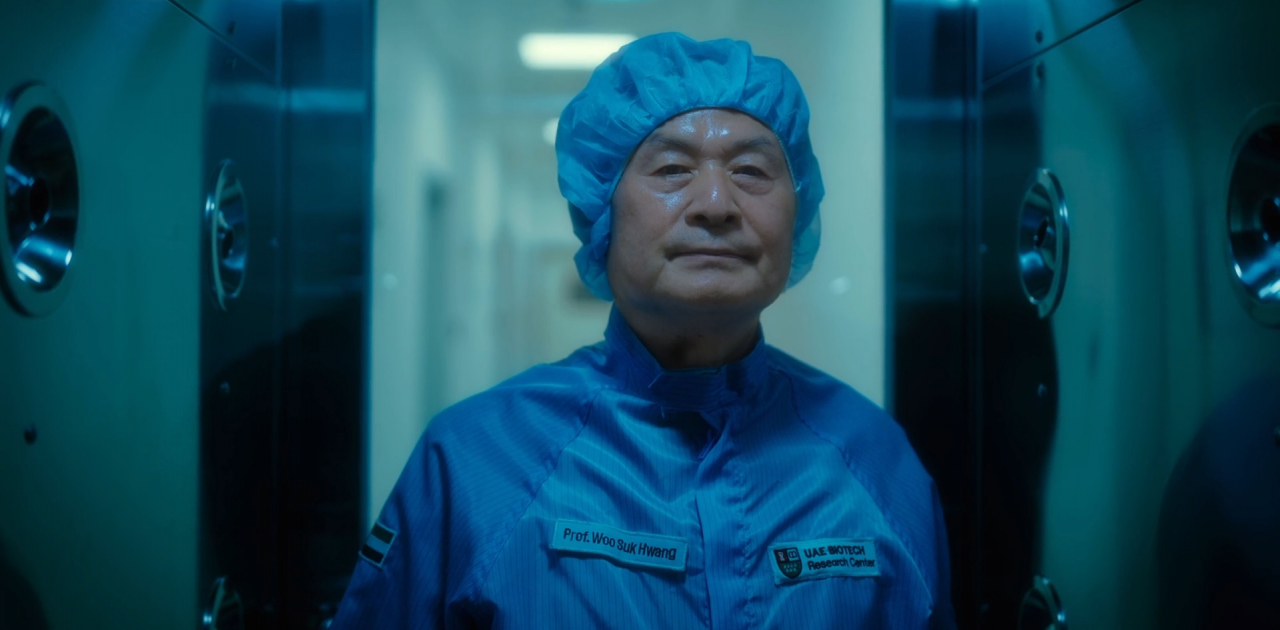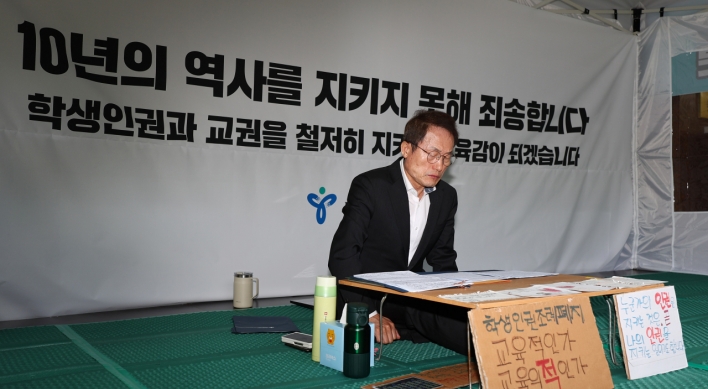[Herald Review] ‘King of Clones’ reexamines story of disgraced S. Korean scientist Hwang Woo-suk
By Lee Si-jinPublished : June 22, 2023 - 13:56

Netflix’s UK original documentary, “King of Clones,” sets off on the jaw-dropping tale of South Korean veterinarian Hwang Woo-suk at a research center in a desert in Abu Dhabi, United Arab Emirates.
Watching a scene where the scientist stands in front of the portraits of key Emirati leaders, the viewers can sense that Hwang is a man with a long, complex story.
Directed by Singaporean filmmaker Aditya Thayi, the 85-minute documentary, “King of Clones,” features one of the biggest scandals in Korean medical history.
Hwang shocked the world with what he claimed was an epic scientific breakthrough in 2004: the cloning of human embryos.
The scientist, who had already made a name for himself with successful animal clonings, became the “hope and pride of Korea” for making the world -- especially the West -- pay attention to the Asian country, which has yet to produce any Nobel Prize winners in science.
However, deepening doubts about Hwang’s human cloning research rose to the surface with suspicions of ethical violations committed in human egg donation and trading. The credibility of his research results -- which had previously seemed almost indisputable -- started to be questioned.
In 2005, it became apparent that the results had been manipulated and that his revolutionary cloning research was a fraud.
The documentary explores the former hero’s sudden rise and shameful downfall, accompanied by the scientist’s own recollections.
The stories of those who eyed Hwang with suspicion along with those who supported him passionately highlight the implications and significance of Hwang's accomplishments in the world of science.
While the documentary is centered on the topic of human embryo cloning, “King of Clones” also offers a critical glimpse into Korean society, which has hastily prioritized results and put aside all other ethical matters and content issues concerning cloning.
His supporters' claim that truth can be overlooked for the sake of national interest felt like dialogue straight out of a movie. The film also sheds light on how the whole country showered unconditional adoration on him as an idealized hero figure.
“When I spoke to some people in America, I learned that the National Institutes of Health’s research guidelines were written on the basis of this scandal, meaning that this case had a ripple effect on the US because of what had happened in Korea. I know that the story has stayed in Korea, but it made me think of a much more global story,” Thayi told The Korea Herald on Wednesday.
The director said that his initial plan was closely related to the themes of grief and death.
“Science can give you the promise that you don’t really have to deal with death or the frailty of a loved one. And we started to construct a bigger narrative of what we wanted to say with Dr. Hwang’s story. We did not intend to focus on the crime. From the early stages, we hoped to look into society through science,” Thayi explained.
“I thought Dr. Hwang’s story gave us everything that we wanted,” the director added.
Thayi said that he was well aware of many viewers' emotions, especially those from Korea. He was also aware that they expected an apology from Hwang for his past misdeeds.
“He did say, ‘I’m sorry,’ in a very odd way, claiming that he would still go back and do what he did before. It took a long time and a lot of interviews. I felt that he was prepared, because he has regurgitated the story quite a few times,” the director said.
The director made attempts to bring the scientist to a pastor who had held a lot of hope in Hwang’s promise to cure his son, thinking such an encounter might stimulate Hwang to apologize.
“I know that Koreans will be upset about it, but there will be people in Korea who might think like the pastor. The stories end up being what they are. Sometimes the documentary takes you in the direction that it goes and that’s where it went,” said the director.
With scenes showing Hwang leading a well-funded animal cloning research center in the UAE, Thayi attempts to raise yet another question.
“The world has a lot of wealthy people. If they decide to do research outside the norms of what we as a society think is right and wrong, what are we going to do about it?"
“King of Clones” will premiere Friday exclusively on Netflix.




![[KH Explains] No more 'Michael' at Kakao Games](http://res.heraldm.com/phpwas/restmb_idxmake.php?idx=644&simg=/content/image/2024/04/28/20240428050183_0.jpg&u=20240428180321)













![[Herald Interview] Mistakes turn into blessings in street performance, director says](http://res.heraldm.com/phpwas/restmb_idxmake.php?idx=652&simg=/content/image/2024/04/28/20240428050150_0.jpg&u=20240428174656)
